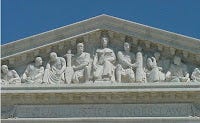Supreme Court to decide important indigent defense ruling.

(Original article appeared in The Crime Report)
A half-century after the Supreme Court’s historic judgment recognizing every American’s right to counsel, the Court is being asked to weigh in on whether there is also a constitutional obligation to ensure that the poorest defendants do not suffer for lack of funds.
The case, Boyer v. Louisiana, turns on a defendant’s claim that his constitutional right to a speedy trial was violated because the state refused to pay for his defense counsel for five years.
The defendant, Jonathan Edward Boyer, now 32, was indicted for first-degree murder in 2002 in connection with the death of Bradlee Marsh, then 21, who gave Boyer and his brother a ride in his pickup truck as they walked along a highway in Sulphur, a town in southwest Louisiana.
The capital charge against Boyer was reduced by prosecutors in 2007 to second-degree murder and armed robbery. He was convicted of both charges in 2009.
The Court’s landmark 1963 Gideon v. Wainwright decision required the state to provide lawyers for defendants, regardless of their ability to pay—a ruling that transformed the nation’s legal landscape. But it didn’t spell out how the lawyers should be provided, much less how they would be paid.
The case now before the Court, which is expected to deliver a ruling later this year, “shines a light on this country’s problems with indigent defense,” says Norman Reimer, executive director of the National Association of Criminal Defense Lawyers (NACDL), which filed one of the amicus briefs supporting Boyer’s argument.
Shortfalls in funding for public defender’s offices across the country mean that the right to counsel promised by Gideon remains unrealized for many poor Americans caught up in the criminal justice system, adds Reimer.
“It’s almost poetic justice that Boyer is before the Supreme Court in this term, which marks the 50th anniversary of Gideon,” he says.
http://www.thecrimereport.org/news/inside-criminal-justice/2013-02-no-money-no-defense
Cornell's Legal Information Institute offers an in depth case analysis- Boyer v. Louisiana:
http://www.law.cornell.edu/supct/cert/11-9953
Justice Policy Institute's report "System Overload- The Costs of Under Resourcing Public Defense 2011"
http://www.justicepolicy.org/uploads/justicepolicy/documents/system_overload_final.pdf


